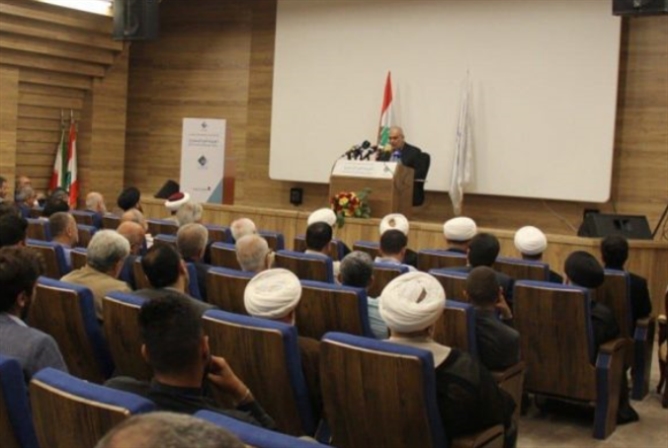Sheikh Samir Khair El-Din gave a speech as the organizer of the conference, saying: “This conference is the culmination of a series of research and development events focused on the revolution. It is a continuation of the previous course of conferences that focused on and discussed the concept of innovation and intellectual ijtihad according to Imam Khamenei. He added, “At the crescent of forty, the studies of the Fifth Conference focus on the concept of the revolution, the scope of its work, and its connection to the forty days.” different, and this contradicts what is known from the life of revolutions, the experience with which revolutionaries have fought throughout history.
He stressed that the Islamic Revolution had concepts that “pulse the revolution given that it is a culture with a driving force for the human self; The relationship between him and the self that believes in him is one of identity, respect, feeling and emotion; Revolutions are often caused by the problem of the oppressed and oppressed man or the worker who has not been given his rights. ” He also believes that the Islamic revolution “arose from what Islamic concepts hold, and not from a stimulus from outside, and the revolution of concepts requires the constant movement of the concepts of life.”
Entitled “The Renewed Islamic Revolution: The Uniqueness of the Thesis”, the head of the “Loyalty to the Resistance” Bloc, MP Muhammad Raad, gave an introductory lecture in which he spoke about the connotations derived from the linguistic expression of the term ” revolution ”. “, Which indicates a partial or general popular movement based on rejection, tension and a leap towards change. The term “revolution” also means that it is not a simple rise or rise of the people, but to them is added the property of fermentation, enthusiasm and enthusiasm to change the existing reality and replace it with the new reality that responds to the aspirations of the revolutionaries and encompasses their vision. ” He added: “The more the level of consciousness flows and the more its horizon encompasses all, the wider the goals that can be achieved. Depending on such background, a person can judge the extent to which he or she can achieve, as well as the type of techniques and behaviors he or she expects to perform.
Concerning the motives of the revolution, he observed: “The impetus of the revolution varies from time to time and from one place to another, depending on the strength of its motive and its stormy mentality, as well as its nature. characteristic of symbols and rulers. , as well as the level of social engagement in its steps. In terms of motivation, people may act voluntarily or motivate or direct anything in opposition to anything related to their livelihood, their dignity, their beliefs and values, their freedom or sovereignty, or their political course implemented in their country. or country.
At the level of intellectual assault, a certain belief in the accuracy, integrity and validity of thought for the implementation of desired changes in the individual and society, “it all does its job, moves people and encourages them to reject the bitter truth in which they live, and works to replace it with a new truth in which justice is achieved and human dignity is preserved. ” He continued, “When it comes to leadership, the extent of people’s reaction depends on their knowledge of that leadership, their experience with its honesty and their confidence in its honesty and ability,” before asking the question, “ Can every revolution be a constantly flowing fountain? ? ” He then replied: “A thoughtful analysis of the experience of the people and of their revolutions shows that the revolution with the longest life in any society is the revolution that begins with the ideological motive of faith, respect for dignity. of man and belief in the centrality of his role in the reconstruction and development of life.
He stressed that it is useful to point out that the Islamic Revolution in Iran, launched “in response to the call for truth raised by Imam Khomeini against the despotic, Shahanshah dictatorship, required a long period of years in which it continued. this cry. through various events on the property, on the street, at school, at the mosque, at the university, at the market, etc., tirelessly for scientific, student and popular activities and for expression of strong unfavorable positions in relation to the policies, decisions and actions of the Shah. .. ”, noting that change is not a sudden commotion, but rather a gradual and gradual change. Contrary to the prevailing opinion that the Islamic Revolution was a sudden revolution launched by Imam Khomeini’s radical change of mind, he sanctified his secret with an impulse.
Ra’ad concluded by emphasizing that “the conclusion drawn from following the idea of the Islamic revolution in speech and the steps of its founder, Imam Khomeini (its leader) and his successor, Imam Khamenei ( long his shadow), is that the project of Islamic revival is a project of leadership, justice and concern for the present and future of mankind… And that the blessed Islamic revolution is the starting point for fully achieving the goals of civilized this project, extends to be the refuge of the people, the whirlwind of their interests and the complexity of their hopes.
Then, on June 29, the conference ended, where researchers from Lebanon, Iraq and Iran considered within the framework of three key issues and concepts related to the Islamic law revolution outside and within the republic. .
Source: Al-Akhbar
